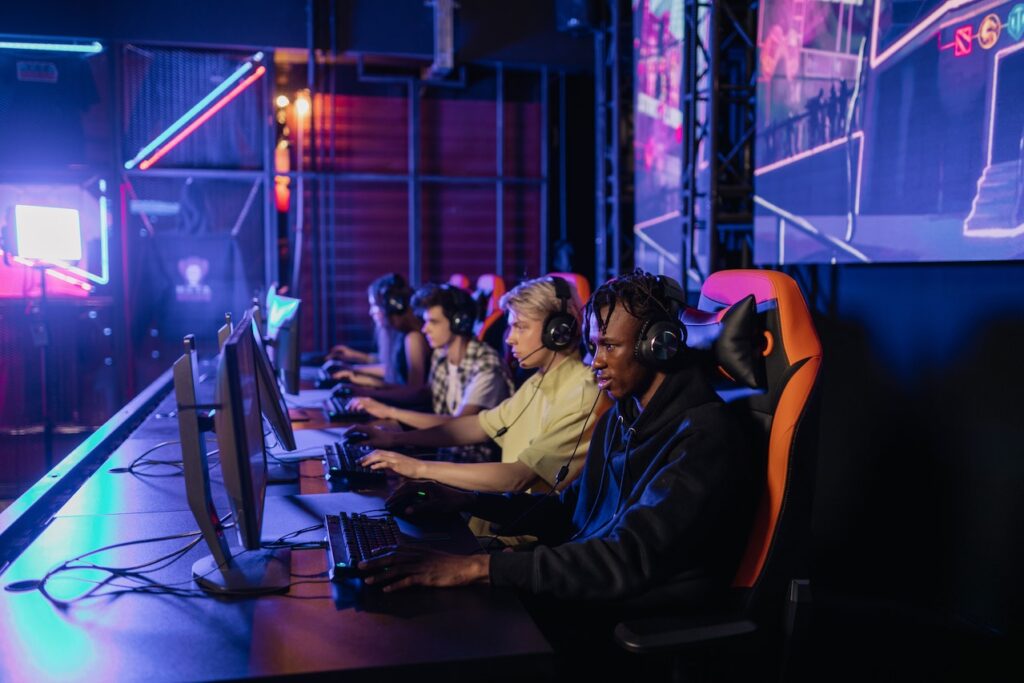As an Amazon Associate Jartan Media earns from qualifying purchases.
When buying a PC for video games, there are several important factors to consider to ensure a smooth gaming experience. Here’s a list of key considerations:
CPU (Central Processing Unit)
Look for a powerful CPU that can handle the demands of modern games. Consider models with multiple cores and high clock speeds for optimal performance.
GPU (Graphics Processing Unit)
A dedicated graphics card is essential for gaming. Look for a GPU that meets the requirements of the games you intend to play and offers good performance for high-resolution and smooth frame rates.
RAM (Random Access Memory)
Sufficient RAM is crucial for gaming. Aim for a minimum of 8GB, but consider 16GB or more for smoother gameplay and to accommodate memory-hungry games.
Storage
Choose between SSDs (Solid State Drives) and HDDs (Hard Disk Drives). SSDs offer faster load times and better overall performance, but they tend to have smaller capacities and higher prices per gigabyte compared to HDDs. Consider a combination of SSD for the operating system and frequently played games, and an HDD for bulk storage.
Operating System
Most games are compatible with Windows, so Windows 10 is generally recommended. However, if you have specific requirements or prefer other operating systems like Linux, ensure game compatibility and driver support.
VR (Virtual Reality)
If you’re interested in VR gaming, ensure that your PC meets the system requirements for the VR headset you plan to use. VR typically demands a powerful CPU and GPU, along with additional USB ports.
Connectivity and Accessories
Check the available ports on the PC, such as USB, HDMI, DisplayPort, and audio jacks. Consider the peripherals you’ll need, such as gaming keyboards, mice, controllers, and monitors. Ensure the PC has sufficient USB ports to accommodate all your devices.
Cooling
Gaming PCs can generate a lot of heat, so make sure the PC has adequate cooling solutions, such as fans or liquid cooling, to maintain optimal temperatures and prevent thermal throttling.
Display
Choose a monitor that suits your gaming preferences. Look for features like high refresh rates (e.g., 144Hz or 240Hz) for smooth gameplay, low response time for reduced motion blur, and a resolution that matches your GPU’s capabilities (e.g., 1080p, 1440p, or 4K).
Resolution and Refresh Rate
Determine the resolution and refresh rate you desire for gaming. Higher resolutions offer better visual fidelity, but require more powerful hardware. Similarly, higher refresh rates provide smoother gameplay but require a capable GPU.
Audio
If audio quality is important to you, consider investing in a sound card or external DAC (Digital-to-Analog Converter) for improved audio performance and support for advanced audio technologies.
Networking
If you plan on playing online games, consider the networking capabilities of the PC. Look for an Ethernet port for stable and fast wired connections, and built-in Wi-Fi if you require wireless connectivity.
Upgradeability
Consider the PC’s upgrade options in the future. Look for expandable RAM slots, available PCIe slots for adding more storage or upgrading the GPU, and a power supply with sufficient wattage to support future upgrades.
Future-Proofing
Consider future technologies and trends when making your purchasing decision. For example, consider support for technologies like ray tracing, DLSS (Deep Learning Super Sampling), or other advancements that may enhance your gaming experience in the long run.
Warranty and Customer Support
Check the warranty terms and customer support reputation of the PC manufacturer or individual component brands. A reliable warranty and good customer support can be crucial if you encounter any issues with your PC.
Budget
Determine your budget and balance it with your gaming requirements. Allocate your funds wisely to get the best possible combination of components within your price range.
Remember, your specific gaming preferences and requirements should guide your decision-making process to ensure a smooth gaming experience. Research, compare specifications, and read reviews to find the best PC that meets your needs and budget.
